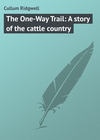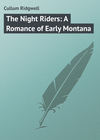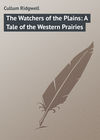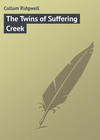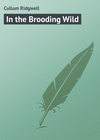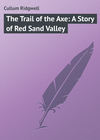Czytaj książkę: «The Golden Woman: A Story of the Montana Hills», strona 7
CHAPTER XI
THE SHADOW OF THE PAST
The gleaming prongs of the fork were sharply withdrawn, and a pleasant voice greeted the girl.
“Guess that was a near thing,” it said half-warningly.
Joan had started back, but at the sound of the voice she quickly recovered herself.
“It was,” she agreed. Then as she looked into the smiling eyes of the stranger she began to laugh.
“Another inch an’ more an’ you’d sure have been all mussed up on that pile of barn litter,” he went on, joining in her laugh.
“I s’pose I should,” Joan nodded, her mirth promptly sobering to a broad smile.
She had almost forgotten her purpose so taken up was she in observing this “scallawag,” as Mrs. Ransford had called him. Nor did it take her impressionable nature more than a second to decide that her worthy housekeeper was something in the nature of a thoroughly stupid woman. She liked the look of him. She liked his easy manner. More than all she liked the confident look of his dark eyes and his sunburnt face, so full of strength.
“Hayforks are cussed things anyway,” the man said, flinging the implement aside as though it had offended him.
Joan watched him. She was wondering how best to approach the questions in her mind. Somehow they did not come as easily as she had anticipated. It was one thing to make up her mind beforehand, and another to put her decision into execution. He was certainly not the rough, uncouth man she had expected to find. True, his language was the language of the prairie, and his clothes, yes, they surely belonged to his surroundings, but there was none of the uncleanness about them she had anticipated.
It was his general manner, however, that affected her chiefly. How tall and strong he was, and the wonderful sunburn on his clean-cut face and massive arms! Then he had such an air of reserve. No, it was not easy.
Finally, she decided to temporize, and wait for an opening. And in that she knew in her heart she was yielding to weakness.
“My housekeeper tells me it was you who handed the farm over to her?” she said interrogatively.
The man’s eyes began to twinkle again.
“Was that your – housekeeper?” he inquired.
“Yes – Mrs. Ransford.”
Joan felt even less at her ease confronted by those twinkling eyes.
“She’s a – bright woman.”
The man casually picked up a straw and began to chew it.
Joan saw that he was smiling broadly, and resented it. So she threw all the dignity she could summon into her next question.
“Then you must be Mr. Moreton Kenyon!” she said.
The man shook his head.
“Wrong. That’s the ‘Padre,’” he announced curtly.
Joan forgot her resentment in her surprise.
“The ‘Padre’! Why, I thought Mr. Kenyon was a farmer!”
The man nodded.
“So he is. You see folks call him Padre because he’s a real good feller,” he explained. Then he added: “He’s got white hair, too. A whole heap of it. That sort o’ clinched it.”
The dark eyes had become quite serious again. There was even a tender light in them as he searched the girl’s fair face. He was wondering what was yet to come. He was wondering how this interview was to bear on the future. In spite of his easy manner he dreaded lest the threats of Mrs. Ransford were about to be put into execution.
Joan accepted his explanation.
“I see,” she said. Then, after a pause: “Then who are you?”
“Me? Oh, I’m ‘Buck,’” he responded, with a short laugh.
“Buck – who?”
“Jest plain ‘Buck.’” Again came that short laugh.
“Mr. Kenyon’s son?”
The man shook his head, and Joan tried again.
“His nephew?”
Again came that definite shake. Joan persisted, but with growing impatience.
“Perhaps you’re – his partner?” she said, feeling that if he again shook his head she must inevitably shake him.
But she was spared a further trial. Buck had been quick to realize her disappointment. Nor had he any desire to inspire her anger. On the contrary, his one thought was to please and help her.
“You see we’re not related. Ther’s nuthin’ between us but that he’s jest my great big friend,” he explained.
His reward came promptly in the girl’s sunny smile. And the sight of it quickened his pulses and set him longing to hold her again in his arms as he had done only yesterday. Somehow she had taken a place in his thoughts which left him feeling very helpless. He never remembered feeling helpless before. It was as though her coming into his life had robbed him of all his confidence. Yesterday he had found a woman almost in rags. Yesterday she was in trouble, and it had seemed the simplest thing in the world for him to take her in his arms and carry her to the home he knew to be hers. Now – now, all that confidence was gone. Now an indefinable barrier, but none the less real, had been raised between them. It was a barrier he felt powerless to break down. This beautiful girl, with her deep violet eyes and wonderful red-gold hair, clad in her trim costume of lawn and serge, seemed to him like a creature from an undreamed-of world, and as remote from him as if thousands of miles separated them. He sighed as Joan went on with her examination —
“I suppose you have come to fetch some of your big friend’s belongings?” she said pleasantly.
For answer Buck suddenly flung out a protecting arm.
“Say, you’re sure getting mussed with that dirty litter,” he said almost reproachfully. “See, your fixin’s are right agin it. Say – ”
Joan laughed outright at his look of profound concern.
“That doesn’t matter a bit,” she exclaimed. “I must get used to being ‘mussed-up.’ You see, I’m a farmer – now.”
The other’s concern promptly vanished. He loved to hear her laugh.
“You never farmed any?” he asked.
“Never.” Joan shook her head in mock seriousness. “Isn’t it desperate of me? No, I’m straight from a city.”
Buck withdrew his gaze from her face and glanced out at the hills. But it was only for a moment. His eyes came back as though drawn by a magnet.
“Guess you’ll likely find it dull here – after a city,” he said at last. “Y’ see, it’s a heap quiet. It ain’t quiet to me, but then I’ve never been to a city – unless you call Leeson Butte a city. Some folks feel lonesome among these big hills.”
“I don’t think I shall feel lonesome,” Joan said quickly. “The peace and quiet of this big world is all I ask. I left the city to get away from – oh, from the bustle of it all! Yes, I want the rest and quiet of these hills more than anything else in the world.”
The passionate longing in her words left Buck wondering. But he nodded sympathetically.
“I’d say you’d get it right here,” he declared. Then he turned toward the great hills, and a subtle change seemed to come over his whole manner. His dark eyes wore a deep, far-away look in which shone a wonderfully tender affection. It was the face of a man who, perhaps for the first time, realizes the extent and depth of his love for the homeland which is his.
“It’s big – big,” he went on, half to himself. “It’s so big it sometimes makes me wonder. Look at ’em,” he cried, pointing out at the purpling distance, “rising step after step till it don’t seem they can ever git bigger. An’ between each step there’s a sort of world different from any other. Each one’s hidden all up, so pryin’ eyes can’t see into ’em. There’s life in those worlds, all sorts of life. An’ it’s jest fightin’, lovin’, dyin’, eatin’, sleepin’, same as everywhere else. There’s a big story in ’em somewhere – a great big story. An’ it’s all about the game of life goin’ on in there, jest the same as it does here, an’ anywher’. Yes, it’s a big story and hard to read for most of us. Guess we don’t ever finish readin’ it, anyway – until we die. Don’t guess they intended us to. Don’t guess it would be good for us to read it easy.”
He turned slowly from the scene that meant so much to him, and smiled into Joan’s astonished eyes.
“An’ you’re goin’ to git busy – readin’ that story?” he asked.
The startled girl found herself answering almost before she was aware of it.
“I – I hope to,” she said simply.
Then she suddenly realized her own smallness. She felt almost overpowered with the bigness of what the man’s words had shown her. It was wonderful to her the thought of this – this “scallawag.” The word flashed through her mind, and with it came an even fuller realization of Mrs. Ransford’s stupidity. The man’s thought was the poet’s insight into Nature’s wonderlands. He was speaking of that great mountain world as though it were a religion to him, as if it represented some treasured poetic ideal, or some lifelong, priceless friendship.
She saw his answering nod of sympathy, and sighed her relief. Just for one moment she had been afraid. She had been afraid of some sign of pity, even contempt. She felt her own weakness without that. Now she was glad, and went on with more confidence.
“I’m going to start from the very beginning,” she said, with something akin to enthusiasm. “I’m going to start here – right here, on my very own farm. Surely the rudiments must lie here – the rudiments that must be mastered before the greater task of reading that story is begun.” She turned toward the blue hills, where the summer clouds were wrapped about the glistening snowcaps. “Yes,” she cried, clasping her hands enthusiastically, “I want to learn it all – all.” Suddenly she turned back and looked at him with a wonderful, smiling simplicity. “Will you help me?” she said eagerly. “Perhaps – in odd moments? Will you help me with those – lessons?”
Buck’s breath came quickly, and his simple heart was set thumping in his bosom. But his face was serious, and his eyes quite calm as he nodded.
“It’ll be dead easy for you to learn,” he said, a new deep note sounding in his voice. “You’ll learn anything I know, an’ much more, in no time. You can’t help but learn. You’ll be quicker to understand, quicker to feel all those things. Y’ see I’ve got no sort of cleverness – nor nuthin’. I jest look around an’ see things – an’ then, then I think I know.” He laughed quietly at his own conceit. “Oh, yes! sometimes I guess I know it all. An’ then I get sorry for folks that don’t, an’ I jest wonder how it comes everybody don’t understand – same as me. Then something happens.”
“Yes, yes.”
Joan was so eager she felt she could not wait for the pause that followed. Buck laughed.
“Something happens, same as it did yesterday,” he went on. “Oh, it’s big – it sure is!” he added. And he turned again to his contemplation of the hills.
But Joan promptly recalled his wandering attention.
“You mean – the storm?” she demanded.
Buck nodded.
“That – an’ the other.”
“What – other?”
“The washout,” he said.
Then, as he saw the look of perplexity in the wide violet eyes, he went on to explain —
“You ain’t heard? Why, there was a washout on Devil’s Hill, where for nigh a year they bin lookin’ for gold. Y’ see they knew the gold was there, but couldn’t jest locate it. For months an’ months they ain’t seen a sign o’ color. They bin right down to ‘hard pan.’ They wer’ jest starvin’ their lives clear out. But they’d sank the’r pile in that hill, an’ couldn’t bring ’emselves to quit. Then along comes the storm, an’ right wher’ they’re working it washes a great lump o’ the hill down. Hundreds o’ thousands o’ tons of rock an’ stuff it would have needed a train load of dynamite to shift.”
“Yes, yes.” Joan’s eagerness brought her a step nearer to him. “And they found – ”
“Gold!” Buck laughed. “Lumps of it.”
“Gold – in lumps!” The girl’s eyes widened with an excitement which the discovery of the precious metal ever inspires.
The man watched her thoughtfully.
“Why aren’t you there?” Joan demanded suddenly.
“Can’t jest say.” Buck shrugged. “Maybe it’s because they bin lookin’ fer gold, an’ – wal, I haven’t.”
“Gold – in lumps!” Again came the girl’s amazed exclamation, and Buck smiled at her enthusiasm.
“Sure. An’ they kind o’ blame you for it. They sort o’ fancy you brought ’em their luck. Y’ see it came when you got around their hut. They say ther’ wasn’t no luck to the place till you brought it. An’ now – ”
Joan’s eyes shone.
“Oh, I’m so glad. I’m so glad I’ve brought them – ”
But her expression of joy was never completed. She broke off with a sharp ejaculation, and the color died out of her cheeks, leaving her so ghastly pale that the man thought she was about to faint. She staggered back and leant for support against the wall of the barn, and Buck sprang to her side. In a moment, however, she stood up and imperiously waved him aside.
There was no mistaking the movement. Her whole manner seemed to have frozen up. The frank girlishness had died as completely as though it had never been, and the man stood abashed, and at a loss for understanding.
Now he saw before him a woman still beautiful, but a woman whose eyes had lost every vestige of that happy light. Despair was written in every feature, despair and utter hopelessness. Her mouth, that beautiful mouth so rich and delicate, was now tight shut as of one in great suffering, and deep, hard lines had suddenly gathered about the corners of it. The change smote him to the heart, but left him utterly helpless.
Realization had come. Joan had suddenly remembered all that lay behind her – all that had driven her to seek the remoteness of the wild Western world. She had sought to flee from the fate which her Aunt Mercy had told her was hers, and now she knew that she might as well try to flee from her own shadow.
Oh, the horror of it all! These people believed that she had brought them their luck. She knew that she had. What was the disaster that must follow? What lives must go down before the sword a terrible Fate had placed in her hand? For the moment panic held her in its grip. For a moment it seemed that death alone could save her from the dread consequences of the curse that was upon her. It was cruel, cruel – the desolation, the hopelessness of it all. And in her sudden anguish she prayed that death might be visited upon her.
But even amidst the horror of her realization the influence of the man’s presence was at work. She knew he was there a witness to the terror she could not hide, and so she strove for recovery.
Then she heard him speak, and at the sound of his quiet tone her nerves eased and she grew calmer.
“I don’t guess you recovered from the storm. I’d sure say you need rest,” Buck said in his gentle, solicitous fashion. And in her heart Joan thanked him for the encouragement his words gave her. He had asked no questions. He had expressed no astonishment, and yet she knew he must have realized that her trouble was no physical ailment.
“Yes,” she said, jumping at the opening he had given her, “I’m tired. I’ll – I’ll go back to the house.”
Buck nodded, disguising his anxiety beneath a calm that seemed so natural to him.
“Jest get back an’ rest. You needn’t worry any ’bout the hosses, an’ cows, an’ things. I’m fixin’ them for the night, an’ I’ll be right along in the morning to do the chores. Y’ see I know this farm, an’ all that needs doin’. Guess I was raised on it,” he added, with a smile, “so the work’s sort o’ second nature to me.”
Joan’s chance had come, but she passed it by. She knew she ought to have refused his help. She ought to have, as Mrs. Ransford had said, sent him about his business. But she did nothing of the sort. She accepted. She did more. She held out her hand to him, and let him take it in both of his in a friendly pressure as she thanked him.
“I’m – I’m very grateful,” she said weakly. And the man flushed under his sunburn, while his temples hammered as the hot young blood mounted to his brain.
A moment later Buck stood staring at the angle of the barn round which Joan had just vanished. He was half-dazed, and the only thing that seemed absolutely real to him was the gentle pressure of her hand as it had rested in his. He could feel it still; he could feel every pressure of the soft, warm flesh where it had lain on his hard palms. And all the time he stood there his whole body thrilled with an emotion that was almost painful.
At last he stirred. He stooped and picked up the discarded fork. He had no definite purpose. He was scarcely aware of his action. He held it for a moment poised in the air. Then slowly he let the prongs of it rest on the ground, and, leaning his chin on his hands clasped about the haft, stared out at the hills and gave himself up to such a dream as never before had entered his life.
The sun was dipping behind the snowcaps, and for half an hour the work he had voluntarily undertaken remained untouched.
How much longer he would have remained lost in his wonderful dreaming it would have been impossible to tell. But he was ruthlessly awakened, and all his youthful ardor received a cold douche as the evening quiet was suddenly broken by the harsh voices of the crowd of gold-seekers, whom he suddenly beheld approaching the farm along the trail.
CHAPTER XII
THE GOLDEN WOMAN
Buck wondered as he noted the extraordinary picture of jubilation which the approaching crowd presented. In all his association with these people he had never witnessed anything to equal it or even come near it. He never remembered anything like a real outburst of joy during the long, dreary months since they had first camped on the banks of Yellow Creek.
He watched the faces as they drew near. From the shelter of the barn, whither he had retreated, he had them in full view. He looked for the old, weary signs of their recent privations and sufferings. There were none, not one. They had passed as utterly as though they had never been.
It was a spectacle in which he found the greatest pleasure. The men were clad in their work-stained clothing, their only clothing. Their faces remained unwashed, and still bore the accumulations of dusty sweat from their day’s fevered labors. But it was the light in their eyes, their grinning faces, the buoyancy of their gait that held him. He heard their voices lifted in such a tone as would have seemed impossible only a few days ago. The loud, harsh laugh, accompanying inconsequent jests and jibes, it was good to hear. These men were tasting the sweets of a moment of perfect happiness. Buck knew well enough that soon, probably by the morrow, the moment would have passed, and they would have settled again to the stern calling of their lives.
All his sympathy was with them, and their joy was reflected in his own feelings. Their hope was his hope, their buoyancy was his buoyancy. For his happiness was complete at the moment, and thus he was left free to feel with those others. Such was his own wonderful exaltation that the thought of the termination of these people’s suffering was the final note that made his joy complete.
He laid his fork aside and waited till they had passed his retreat. The object of their journey was obviously the farmhouse, and he felt that he must learn their further purpose. He remembered Joan’s going from him. He had seen the pain and trouble in her beautiful eyes, and so he feared that the sudden rush of animal spirits in these people would drive them to extravagances, well enough meant, but which might worry and even alarm her.
He moved quickly out of the barn and looked after them. They had reached the house, and stood like a herd of subdued and silly sheep waiting for a sign from their leader. It was a quaint sight. The laugh and jest had died out, and only was the foolish grin left. Yes, they certainly had a definite purpose in their minds, but they equally certainly were in doubt as to how it should be carried out.
Buck drew nearer without attracting their attention. The men were so deeply engaged with the dilemma of the moment that he might almost have joined the group without observation. But he merely desired to be on hand to help should the troubled girl need his help. He had no desire to take active part in the demonstration. As he came near he heard Beasley’s voice, and the very sound of it jarred unpleasantly on his ears. The man was talking in that half-cynical fashion which was never without an added venom behind it.
“Well,” he heard him exclaim derisively, “wot’s doin’? You’re all mighty big talkers back ther’ in camp, but I don’t seem to hear any bright suggestions goin’ around now. You start this gorl-durned racket like a pack o’ weak-headed fools, yearnin’ to pitch away what’s been chucked right into your fool laps jest fer one o’ Blue Grass Pete’s fat-head notions. Well, wot’s doin’? I ask.”
“You ke’p that ugly map o’ yours closed,” cried Pete hotly. “You ain’t bein’ robbed any.”
“Guess I’ll see to that,” retorted Beasley, with a grin. “The feller that robs me’ll need to chew razors fer a pastime. If it comes to that you’re yearnin’ fer glory at the Padre’s expense – as usual.”
Buck’s ears tingled, and he drew closer. Beasley always had a knack of so blending truth with his personal venom that it stung far more than downright insult. He wondered what the Padre’s generosity had been, and wherein lay its connection with their present purpose. The explanation was not long in coming, for Montana Ike took up the challenge amidst a storm of ominous murmurs from the gathered men.
“Don’t take nuthin’ from him,” cried the youngster scornfully. Then he turned on Beasley fiercely. “You need Buck around to set you right, Mister Lousy Beasley,” he cried. “We ain’t robbin’ anybody, an’ sure not the Padre. He found that nugget, an’ it’s his to give or do wot he likes with. The gal brought us the luck, an’ the Padre guessed it was only right she should have the first find. That nugget was the first find, an’ the Padre found it. Wal!” But as no reply was forthcoming he hurried on, turning his tongue loose in the best abuse he could command at the moment. “You’re a rotten sort o’ skunk anyway, an’ you ain’t got a decent thought in your diseased head. I’d like to say right here that you hate seein’ a sixty-ounce lump o’ gold in any other hands than your own dirty paws. That’s your trouble, so jest shut right up while better folks handles a matter wot’s a sight too delicate fer a rotten mind like yours.”
The smile had returned to every face except the foxy features of the ex-Churchman, who for once had no adequate retort ready. Curly Saunders nodded appreciation, and helped to solve the momentary dilemma prevailing.
“That’s sure done it fer you, Montana,” he cried gleefully. “You make the presentation. I’d say I never heard so elegant a flow of argyment in this yer camp. You’ll talk most pretty to the leddy.”
“An’ it ain’t fer me to say I can’t do it if need be, neither,” said Montana modestly. “Don’t guess it’s much of a stunt yappin’ pretty to a sorrel-topped gal.”
Abe Allinson laughed.
“It’s sure up to you, Ike,” he said. “Guess you best git busy right away.”
The rest waited for the youngster’s acceptance of the responsibility, which promptly came with perfect good-will.
“Gee! But you’re a gritty outfit,” he cried, with a wide grin. “Say, I guess you’d need a fence around you shootin’ jack-rabbits. Jack-rabbits is ter’ble fierce. Guess you’d most be skeered to death at a skippin’ lamb bleatin’ fer its mother. Can’t say I ever heerd tell as a feller need be skeered of a pair o’ gal’s eyes, nor a sight o’ red ha’r. You said it was red, Pete, didn’t you? I’d sure say a bright feller don’t need to worry any over talkin’ pretty to a gal like that. She’s up agin a proposition if she thinks she ken skeer me. Wher’ is she? Jest call her out. She’s goin’ to git her med’cine right here in the open. I ain’t doin’ no parlor tricks.”
The boy stood out from the crowd with a decided show of mild bravado, but he glanced about him, seeking the moral support of his fellows.
“You best knock on the door, Ike,” said Curly quietly.
Ike hesitated. Then he turned doubtfully to those behind.
“You – you mean that?” he inquired. “You ain’t foolin’ none?” Then, as though realizing his own weakness, he began to bluster. “Cos I ain’t takin’ no foolin’ in a racket o’ this sort. An’ any feller thinks he ken fool me’ll sure hate hisself when I’m through with him.”
A mild snicker greeted his “big talk,” and the boy flushed hotly. He was half-inclined to add further resentment, but, second thoughts prevailing, he abruptly turned to the door and hammered on it as though anticipating stern resistance from those within.
Inside the house Mrs. Ransford was debating the situation with her mistress. She had witnessed the advance of the besieging party, and, half-frightened and half-resentful, the latter perhaps the more plainly manifested, she was detailing in unmeasured terms her opinions and fears to the still harassed girl.
“Jest git a peek at ’em through the window, miss – ‘ma’m’ I should say, on’y I don’t allus remember right, as you might say. Ther’s twenty an’ more o’ the lowest down bums ever I see outside a State penitentiary. They’re sure the most ter’blest lot ever I did see. An’ they got ’emselves fixed up wi’ guns an’ knives, an’ what not an’ sech, till you can’t see the color o’ their clothes fer the dirt on ’em. I’ll swar’ to goodness, as the sayin’ is, they ain’t never see no water sence they was christened, if they ever was christened, which I don’t believe no gospel preacher would ever so demean himself. An’ as fer soap, say, they couldn’t even spell it if you was to hand ’em the whole soap fact’ry literature of a fi’-cent daily noos-sheet. They’re jest ter’ble, an’ it seems to me we sure need a reg’ment o’ United States Cavalry settin’ around on horses an’ field guns to pertect us, ef we’re to farm this one-hossed layout. They’re ‘bad men,’ mum, miss – which I made a mistake ag’in – that’s wot they are. I’ve read about ’em in the fi’-cent comics, so I sure know ’em when I see ’em. You can’t never make no mistake. They’re jest goin’ to shoot us all up to glory, an’ they’ll dance around on our corpses, same as if they was nuthin’, nor no account anyways.”
In spite of her recent shock Joan found herself smiling at the strange mixture of fear and anger in the old woman’s manner. But she felt it necessary to check her flow of wild accusations. She guessed easily enough who the men were that were approaching the house, but their object remained a mystery.
“You’re hasty. You mustn’t judge these people by their appearance. They’re – ”
But the feverish tongue was promptly set clacking again.
“An’ wot, I asks, is they to be judged by if not by wot they are? They jest come along a-yowlin’, an’ a-shootin’ off’n their guns an’ things, same as they allus do when they’s on the war-path. Scalps, that’s wot they’s after. Scalps, no more an’ no less. An’ to think o’ me at my time o’ life a-fallin’ a prey to Injuns, as you might say. Oh, if on’y my pore George D. Ransford was alive! He’d ’a’ give ’em scalps. He was a man, sure, even though he did set around playin’ poker all night when I was in labor with my twins. He was a great fighter was George D. – as the marks on my body ken show to this very day.”
At that instant there was a terrific knocking at the door which opened directly into the parlor in which the waiting women were standing, and the farm-wife jumped and staggered back, and, finally, collapsed into an adjacent chair.
“Sakes on us,” she cried, her fat face turning a sort of pea-green, “if only my pore George D. – ”
But Joan’s patience could stand no more.
“For goodness’ sake go back to your kitchen, you absurd creature. I’ll see to the matter. I – ”
But the old woman wobbled to her feet almost weeping.
“Now, don’t ’ee, miss,” she cried in her tearful anxiety, getting her form of address right the first time. “Don’t ’ee be rash. Ther’ll be blood spilt, ther’ sure will. Ther’s on’y one way, miss, you must talk ’em nice, an’, an’ if they go fer to take liberties, you – why you,” she edged toward her kitchen, “you jest send for me right away.”
She hurried out, and the moment she was out of sight fled precipitately to the farthest extremity of her own domain and armed herself with the heavy iron shaker of the cook-stove.
In the meantime Joan went to the door and flung it wide open. In spite of the farm-wife’s warnings she had not a shadow of doubt as to the peaceful object of the visitation, and rather felt that in some sort of way it was intended as an expression of good-will and greeting. Had not Buck told her that they held her in the light of some sort of benefactor? So she stood in the doorway erect and waiting, with a calm face, on which there was not a shadow of a smile.
She took in the gathering at a glance, and her eyes came to rest upon the foremost figure of Montana Ike. She noted his slim, boyish figure, the weak, animal expression shining in his furtive eyes. To her he looked just what he was, a virile specimen of reckless young manhood, of vicious and untamed spirit. She saw at once that he was standing out from his companions, and understood that, for the moment at least, he was their leader.
“Good-evening,” she said, her attitude mechanically unbending.
“Evenin’, miss,” responded Ike bravely, and then relapsed into a violent condition of blushing through his dirt.
He stood there paralyzed at the girl’s beauty. He just gaped foolishly at her, his eyes seeking refuge in dwelling upon the well-cut skirt she wore and the perfect whiteness of the lawn shirt-waist, which permitted the delicate pink tinge of her arms and shoulders to show through it.
All his bravery was gone – all his assurance. If his life had depended on it not one word of an address on behalf of his fellows could he have uttered.
Joan saw his confusion, and mercifully came to his rescue.
“You wish to see me?” she inquired, with a smile which plunged the boy into even more hopeless confusion.
As no answer was forthcoming she looked appealingly at the other faces.
“It’s very kind of you all to come here,” she said gently. “Is – is there anything I can – do for you?”
Suddenly Beasley’s voice made itself heard.
“Git busy, Ike, you’re spokesman,” he cried. “Git on with the presentation – ladle out the ad – dress. You’re kind o’ lookin’ foolish.”
He followed up his words with his unpleasant laugh, and it was the sting the youthful leader needed.
He turned fiercely on the speaker, his momentary paralysis all vanished.











